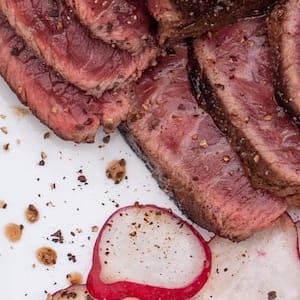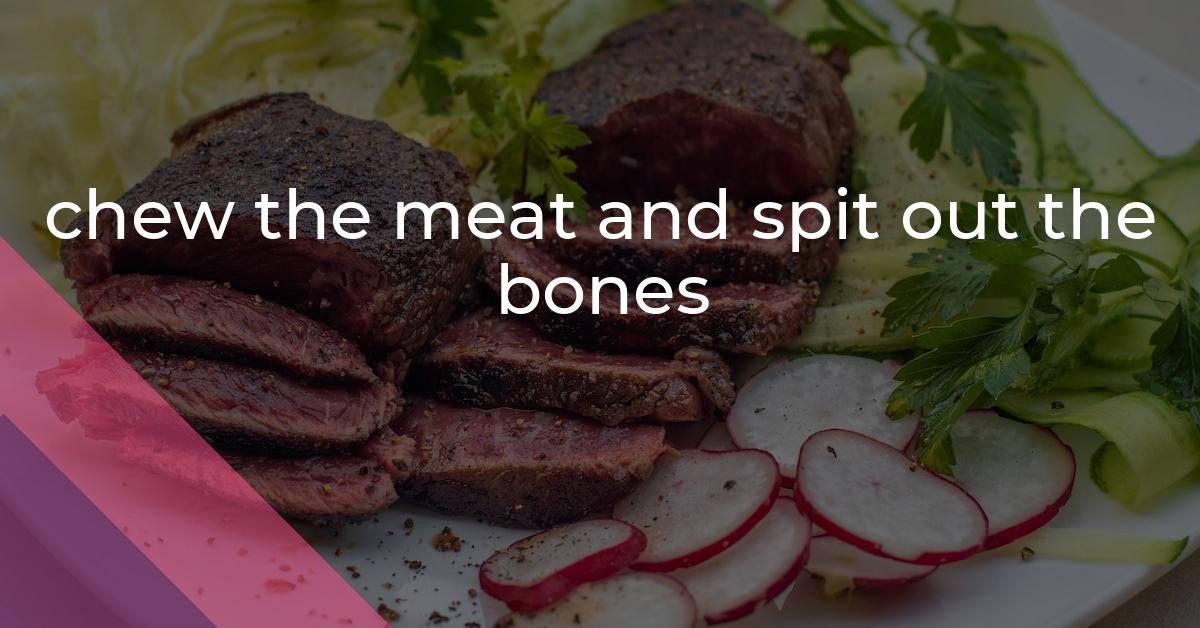chew the meat and spit out the bones: Idiom Meaning and Origin
What does ‘chew the meat and spit out the bones’ mean?
The idiom "chew the meat and spit out the bones" means to extract the useful or valuable parts of something while discarding the rest. It suggests the act of separating the good from the bad or the important from the unimportant.

Idiom Explorer
The idiom "have a bite" means to eat a small amount of food, often as a snack or to taste something. It implies taking a quick break to satisfy hunger or try a small portion of something.
The idiom "good enough to eat" means something is extremely delicious or attractive, to the point where one might want to consume or devour it.
The idiom "fish out" means to find or extract something or someone, often from a difficult or obscure place or situation.
The idiom "eat it" means to accept or tolerate something unpleasant or embarrassing, often with resignation or humility.
The idiom "eat an elephant one bite at a time" means tackling a large or overwhelming task by breaking it down into smaller, more manageable parts.
The idiom "eat and leave no crumbs" means to consume or use something completely without wasting or leaving any trace or evidence behind.
The idiom "cut to pieces" means to criticize or attack someone or something severely and mercilessly.
The idiom *chow down* means to eat a large amount of food quickly and greedily.
Hidden Delight
The idiom "chew the meat and spit out the bones" is a metaphorical expression that conveys the idea of selectively extracting valuable information or elements from a larger whole while discarding the rest. This idiom is often used in a figurative sense to describe a process of critical analysis, evaluation, or discernment.
It is important to note that this idiom often implies a level of skepticism or caution towards the information or material being evaluated. It suggests that one should approach the subject matter with a discerning eye and not take everything at face value. The phrase "chew the meat and spit out the bones" encourages individuals to carefully examine a topic or idea, extracting what is valuable and discarding what is unhelpful or potentially harmful.
Let's explore how this idiom is related to several other idioms that involve the act of chewing. These idioms include "chew off", "chew up", and "chew on".
The idiom "chew off" is a related expression that means to detach, remove, or break off something by biting or chewing. When applied to the concept of "chewing the meat and spitting out the bones", this idiom suggests the importance of selectively detaching or removing the valuable parts of a larger whole while discarding the rest. Just as one would bite off a piece of food and discard the inedible parts, this idiom reminds us to focus on the valuable aspects of information or ideas while disregarding what is irrelevant or unhelpful.
On the other hand, the idiom "chew up" means to chew something vigorously or thoroughly. In the context of "chewing the meat and spitting out the bones", this idiom emphasizes the idea of thoroughly examining, analyzing, and understanding the valuable elements of a subject matter. It encourages individuals to delve deeply into the information or ideas presented, much like one would chew up food to thoroughly consume and digest it. By "chewing up" the information, individuals can extract the most valuable insights while discarding what is unnecessary or unhelpful.
Lastly, the idiom "chew on" means to think about or contemplate something. When related to "chewing the meat and spitting out the bones", this idiom highlights the importance of taking the time to carefully consider and reflect upon the valuable aspects of a topic or idea. It encourages individuals to engage in a thoughtful evaluation process, just as one would chew on food to savor its flavors and texture. By "chewing on" the information or ideas, individuals can gain a deeper understanding and make more informed judgments.
The idiom "chew the meat and spit out the bones" reflects the idea of extracting valuable information while disregarding the irrelevant or undesirable parts. Its metaphorical nature emphasizes the need for critical thinking, discernment, and careful evaluation. While its precise origin is unknown, the idiom appeals to audiences who value analytical thinking and the exercise of judgment. By encouraging individuals to be selective and cautious in their approach to information, this idiom prompts them to engage in a thoughtful evaluation process. It reminds us that not everything presented to us is worthwhile or reliable, and that a careful examination of content or ideas is necessary to separate the valuable from the undesirable.
Example usage
Examples:
- She listened to the speaker's presentation and carefully chewed the meat and spit out the bones, taking away the valuable information while disregarding the irrelevant points.
- The book had some great insights, but also a few questionable claims. I had to read it with a critical mindset, chewing the meat and spitting out the bones.
- When analyzing different perspectives on a political issue, it is important to chew the meat and spit out the bones, separating the valid arguments from the flawed ones.
More "Evaluation" idioms



